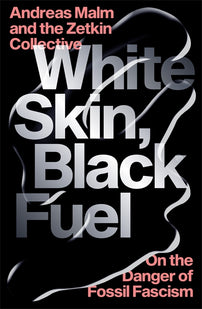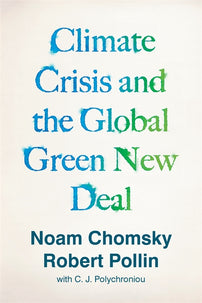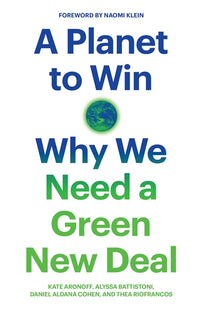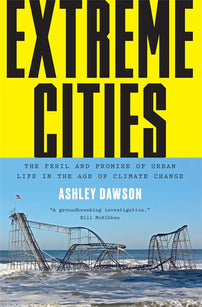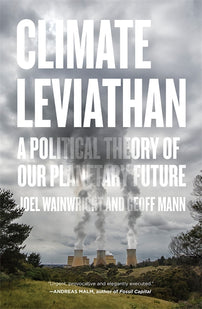Foreword to the Spanish Translation of White Skin, Black Fuel
Climate fascism is percolating through the cracks of global capitalist crisis. The Zetkin Collective's foreword to the forthcoming Spanish-language edition of White Skin, Black Fuel offers a concise analysis of the current juncture and outlines what must be done to resist the forward march of climate fascism.

**The following text is the foreword to the Spanish translation of Andreas Malm's and the Zetkin Collective's White Skin, Black Fuel. The Spanish version will be published with Captain Swing in 2023.
By the time you have read this foreword, between two to three species will have gone extinct. As we write, there are wildfires in Spain, France and California, temperatures exceeding 41 degrees Celsius in China, mega-floods in Australia, Pakistan and Brazil, typhoons in Vietnam and the Philippines, megadroughts in the US, the Sahel and Chile, and glaciers collapsing in the Alps and the Andes. Thousands have been killed, hundreds of thousands displaced, and millions put on the brink of starvation. We live in a world of extremes.
It is these extremes that the news outlets keep reporting as ‘records’ of heat, cold, flooding, and drought. But such announcements of new ‘records’ remain silent about the reality of tipping points, the cascading effects of an unimaginably complex interaction between the five Earth systems – geosphere, biosphere, cryosphere, hydrosphere, and atmosphere. What we are both witnessing and causing is not a set of records but rather, as it has been called since the Covid-19 crisis, a ‘new normal’. What has been eradicated by this new state of ‘normality’ are the very characteristics of the word: expectancy, linearity, and stability. Our new normal is a world of ecological extremes unfolding at an unforeseeable pace and unparalleled magnitude.
Yet, it is not only the climate that is changing. Events since the publication of White Skin, Black Fuel have been marked by political violence. Far-right governments around the world are frantically responding to an escalating energy crisis while tightening their borders against wartime and climate refugees. Just as trees’ xylem and phloem tissue run so dry that the tiniest spark suffices to set vast forests aflame, our political climate appears so combustible that new frictions could set its foundation ablaze.
The climb in global temperatures, however, follows no linear path. To the contrary, the increasing instability of complex climatic systems will also result in coldness. As melting ice sheets release an abundance of freshwater, the Atlantic Meridional Overturning Circulation (AMOC), one of the world’s strongest ocean currents, is foreseen to collapse. Without the AMOC pushing hot equatorial waters from the Gulf of Mexico across to the Eastern coastline of the United States, up to Newfoundland and then across the Atlantic Ocean, where it splits in two – crossing to Northern Europe and recirculating off West Africa – the disruption of the cryospheric cycle will plunge Western Europe and North America into freezing winters in the years ahead.[1] The world is not only getting hotter, but also colder in its political emotions. Libertarians and fascists disavow responsibility for the climate crisis with the stone-hearted scapegoating Muslims, people of colour, women, queers and trans people. Fossil capitalism obstructs our capacity for human warmth and solidarity.
It is in this world of hot and cold extremes, that on 16 May 2022 18-year-old Payton Gendron drove 320 kilometers from his hometown Conklin to a predominantly Black neighborhood of Buffalo, New York. One day later, he opened fire in a supermarket. Ten people were killed, three others injured. The names of the deceased: Roberta A. Drury. Margus D. Morrison. Andre Mackniel. Aaron Salter. Geraldine Talley. Celestine Chaney. Heyward Patterson. Katherine Massey. Pearl Young. Ruth Whitfield. Just like the mass shooters of El Paso and Christchurch of 2019, whose massacres are discussed in Chapter 6 of the book, Gendron is a self-proclaimed “ethno-nationalist eco-fascist national socialist”, a proud “racist, anti-semite, white-supremacist” and anti-trans murderer.[2] In his 180-page manifesto, Gendron describes himself as representing "millions of Europeans and other ethno-nationalists who want to live in peace among their own kind, to practice their traditions in their country, and to decide the future of their own kind." In desperately trying to secure the "future of our people and the future of white children", Gendron sought to scapegoated the victims as "Replacers": non-white people with ‘high reproductive rates’, in "white homelands," orchestrated by Jews to "replace" the white population.
From this far-right perspective, the threat to the nation is also a threat to nature. Eco-fascism, in its various manifestations, is based on a mystification of a natural connection requiring protection, a connection between the “pure” people of an evoked nation and the natural environment encircled by a border fence. Gendron allegedly “does not hate a black man or woman living in their homelands”. But he believes non-whites entering and inhabiting the "fatherland" are what "pollute" nature, weaken the connection between whites and their environment, and cause the depopulation and demise of white nations. As Chapter 5 of White Skin, Black Fuel elaborates: ecology becomes a border. The theory of ‘population exchange’ sees white people as victims of a conspiracy. It justifies racism, anti-Semitism and Islamophobia with an alleged need to protect white people. In times of climate crisis, when climate and environmental protection gain discursive dominance, eco-fascists feel compelled to ‘preserve their environment’. Hot love for the white nation, cold hate for the other.
Gendron’s attack spurred discussions about stricter gun laws in the US. But the gun lobby, led by the 5-million-member National Rifle Association (NRA), maintains a tight political grip. Rather than banning automatic rifles, pro-gun politicians spanning the rightwing of the Democratic Party to the entire GOP continuously seek to depoliticize mass killings. For conservatives and many moderates, it is neither political ideology, material inequality, nor gun accessibility that kills people; it is an individual's degrading mental health. This individualization fosters violence in many ways, two of which deserve greater attention.
The saying ‘guns don’t kill people, people kill people’ is not completely vacuous. But it is not just people with guns that kill others. It is the reach of far-right discourses and of fascism – both as an ideology and as a material structure – that produces such violence. Furthermore, it is liberals’ refusal to understand the power structures of the far right and their connections to mainstream conservatism that undergirds this ongoing terror. As long as we view only those who point guns at people as fascists, we will not be able to halt the far right’s increasing radicalization and growing strength. Modern fascism is a war fought through tropes, memes, metapolitics, and ideology. It disperses racism, anti-feminism, fake news about ‘cultural Marxism’, and distrust in democracy. Reducing their radicalizing potential to a false idea of individual responsibility fails to grasp the forces strengthening eco-fascism and far-right politics today.
Just as fascism is more than the act of killing, it is more than the act in the present. Though the far-right presents itself as a civil ‘early warning system’ – pointing to the potential of institutional collapse in times of increased migration, inflation, or energy black-outs – their hunger for crisis far exceeds any desire to prevent it. It is almost ironic that the disseminators of a sweeping range of conspiracy theories about the fall of democracy, the nation, and individual freedom are the denialist vanguards dismissing the most acute threats of mass extinction. Some far-right protagonists may have bought into the late-twentieth-century climate denialist machine which, as Chapter 1 explains, was orchestrated by fossil lobbies to protect their profits. But others are not so blind. For them, the catastrophes wrought by climate change are only aiding the cause.
[book-strip index="1" style="display"]As the Great Depression should have taught us, the far right mobilizes best in times of political chaos, deep-seated insecurity, and growing poverty. The idea that crisis produces a state of social anxiety requiring individuals to transfer their freedom to a strong protector found its highest modern expression in thinkers like Thomas Hobbes and Carl Schmitt. And it regains relevance in times of social upheaval. The far right, and by extension eco-fascists, might proclaim their desire to safeguard a nationally-bordered nature and people. But the ultimate battle they are fighting is for the supremacy of white men. The climate emergency, now and in the future, affects differently positioned people in utterly different ways. It is those who have been oppressed by a system responsible for the climate crisis that will suffer from it the most. Once again, for the far-right, climate change may not only be a neglectable occurrence, but a welcome disaster. It prepares conditions for what they call Day X, when social and environmental catastrophe is so grave that fascist prophets can rise from the rubble to rebuild the nation.
One of these mystified days of national defense was 24 February 2022, when the ultra-nationalist Vladimir Putin ordered the first shots onto Ukrainian civilians. At the time of writing, the Ukrainian civilian death toll is 5,718 and rising. Long before the invasion, Putin was celebrated by far-right leaders for his authoritarianism, militarism, nationalist imperialism, anti-abortion politics, and embodiment of hyper-masculinity. Tit for tat, Putin has supported far-right politics abroad, whether through clandestine campaign funding or election meddling. This is Putin’s own version of Day X. To rescue the Russian nation from threats posed by the West, an emergent fascism was mobilized in the language of ‘anti-fascism’. In this discourse Ukraine’s Western rapprochement evokes Nazi Germany’s invasion of the Soviet Union, triggering the lingering trauma of the Great Patriotic War. As Tatiana Zhurzhenkohas argues, Putin is building a vision of his empire upon “Russia’s only remaining positive legacy of the Soviet era” [3]. The nationalist use of victorious battles in the past against the specter of enemy invaders in the present is what Chapter 8 of White Skin, Black Fuels describes as ‘the myth of palindefence’.
The invasion has already begun to transform far-right politics far outside Russia. So far, with more or less success, Victor Orbán, Marine Le Pen and some other leaders have walked a thin balance beam, neither completely embracing nor fully disavowing Putin. But others have been caught in their own traps. After donning a Putin shirt on Moscow’s Red Square, Mateo Salvini of the Italian Lega party clumsily recanted his support only to be overtaken by Giorgia Meloni of the far-right Brothers of Italy. In the United States, Donald Trump and far-right pundit Tucker Carlson celebrated Putin’s genius only to then qualify their praise. Elsewhere, however, many far-right leaders are holding the line. The German AfD was forced to conclude its annual party conference two days early amidst an internal split over the Russian invasion, spearheaded by the pro-Putin figureheads Tino Chrupalla and Björn Höcke. In Spain, by contrast, the Vox party has flipped the far-right script. While leaning into the liberal framing of a Cold War resurrection, Vox’s Santiago Abascal has welcomed Ukrainian refugees in the name of Western Civilization and pitted them against demonized and racialized Muslim refugees crossing the Mediterranean.
Meanwhile a resurgent Cold War imagination has proven effective in undercutting mobilization for a socio-ecologically just transition from below and climate action from above. As this book explains, fossil fascism, eco-fascism, and green nationalism are not isolated phenomena. They are propped up by liberals and conservatives alike, with ample examples found in Part I of the book. Whether because or despite the climactic implications, as seen during the COP 26 negotiations in Glasgow, Western politicians are committed to tolerating one of the world’s most virulent fascist machines: the Hindutva nationalism of Indian president Narendra Modi, which legitimizes the disenfranchisement and massacre of Muslim citizens while its leader performs a geopolitical morality play. In shifting all attention and massive funds to the Russia-Ukraine war, Western politicians follow the call of fossil capitalists to sacrifice the renewable energy transition in the name of national security while partnering up with authoritarian regimes around the world. In this regard, two recent developments – energy politics and inflation trends – substantiate the book’s main thesis that “the anti-climate politics of the far right have risen in conjunction with some pressing material interest of the dominant classes”. The ongoing collusion and radicalization of fossil capital and liberal ideology is more than a mere hypothesis.
In particular, the European Union (EU), where 55% of energy demand relied on imported Russian methane prior to the invasion of Ukraine, has used the securitization of energy availability rather than distribution to bring back fossil fuels and nuclear at a time when the climate movement had made progress. Across the EU we are witnessing the ramping up of fossil fuel production, the return of nuclear, and the sinking of public wealth into the building of Liquified Natural Gas (LNG) terminals. The latter is praised as the cleanest fossil fuel and the ‘energy of the future’ by major exporters (Australia, Qatar, Nigeria, the United States) and major importers (China, Japan, the European Union) alike. While the combustion of LNG generates between 30%-45% less CO2 than other fossil fuels, the energy-intensive processes of fracking, liquification, and transportation virtually erase any climate benefits of natural gas relative to coal and oil. Once again, it seems ironic that the International Panel for Climate Change (IPCC) has published three reports within the same period that fossil capitalists around the world have pushed policymakers to drop climate goals for the foreseeable future. The reports are so straightforward in their findings that it is impossible to reasonably blame the obstruction of climate action on a lack of knowledge or information. It has long been clear, but it has never been clearer: We need to immediately drop fossil-related activity which, even so, may still exceed the 1.5°C by the early 2030s. We need to protect and expand natural carbon sinks like forests and oceans to restore their natural capacity to remove CO2 from the atmosphere. We need massive investment in renewable energy and infrastructure while limiting the energy budget. We need to prioritize people over profit to secure a socially just transition.
The energy crisis is not the only calamity establishment politicians have swept under the rug of the Russian invasion. Together with the highest inflation in decades, the energy crisis is equipping both green and fossil capitalists with yet another pretense to fight a class war against workers and the climate. While the dominant narrative holds that the inflation rate is spiking due to labor shortages, snarled supply chains, or high domestic demand, ecological breakdown lies at the root of so many supply shortages. In other words, pandemic-related inflation must be tied back to the outbreak and transmission of zoonotic diseases yielded by deforestation and animal husbandry. Droughts are drying up major waterways, undercutting global trade, and disrupting supply chains. Long before the Russian invasion, global wheat prices rose due to drought as well as the myopia of financial market speculation. The climate emergency is under-reproducing nature, which is now causing a lack of supply and a rise in prices. This is not to worship at the altar of global trade. Rather, we need to decommodify basic life-goods and collectivize our modes of living to reduce excessive energy spending. But with politicians blinded to the real causes of the energy and inflation crises and corporations lavishing in excess profits, people have been left to freeze and famish.
In the United States, the fossil fuel industry and its backers flexed their muscles once again by defeating Joe Biden’s signature “Build Back Better” bill, which would have included core decarbonization measures from the Green New Deal. It was only thanks to organized pressure from the left that Joe Manchin finally yielded to a watered-down climate bill framed in terms of anti-inflation policy and “balanced” by expanding fossil fuel extraction. The freshly minted UK Prime Minister and self-identified Thatcherite, Liz Truss, lifted a 2019 moratorium on the fracking of shale gas and licensed new oil and gas fields in the North Sea within her first week in office, only to propose massive tax cuts for the rich soon thereafter. At Truss’ side is newly appointed minister of business and energy, Jacob Rees-Mogg, whose climate denialist politics are discussed in greater detail in Chapter 2. Meanwhile, in the European Union, policy makers are desperately holding onto the Energy Charter Treaty (ECT), a 1990’s era legislation protecting the profits of foreign investors and energy companies to the detriment of national climate policy. Italy just lost an arbitration ruling to British oil company Rockhopper: 250 Million Euros of taxpayer money are now being transferred from state coffers to the fossil giant due to Italy’s ban on offshore drilling. The EU refuses exiting the ECT, which IPCC lead-author Yamina Shaeb calls the “ecocide treaty”. Instead, European leaders are betting on investments and innovations in nuclear, renewables, and natural gas.
In times like these the lines between green capitalism and fossil capitalism become ever more blurred. Liberals around the world are not only idly watching the fusion of fossil capitalism and far-right politics; they are failing to offer real solutions to the climate crisis and allowing the death drive of fossil fascism to run at an even grander scale (Chapters 9-11). Free-market liberals donning light red and green coats create new opportunities for oil-smeared mobs in brown boots to gain power. Especially illustrative is the failure of moderates to initiate socio-ecologically just conservation efforts or guarantee sufficient legal protections for climate refugees. Anti-immigrant anxiety and local conservationism have been key to far-right politics since the nineteenth century. If CO2 reduction approaches to the climate crisis continue to be pursued, and utterly insufficient mitigation policies continue to put Most Affect Peoples and Places (MAPA) at risk of disaster and adaptation measures qua robust laws and rewilding are not taken, liberals will be complicit in an unfolding environment of destruction, chaos, and death.
The globe-spanning effects are felt most dramatically in places like the Tanzanian Ngorongoro district or the Yanomami territory in Brazil. In June 2022, at least 31 Massai pastoralists fell victim to eviction efforts undertaken by the Tanzanian government to free the land for conservation, trophy hunters, and tourism companies, with the most prominent buyer being a company from the oil-rich United Arab Emirates. The Malthusian specter of ‘overpopulation’ and a flawed environmentalist politics are again being used to shield capitalist land grabs. Indigenous land protection has thus far proved to be the only method that has actually achieved a reduction in CO2 emissions and sustained biodiversity. Indeed, the false idea that deteriorating climatic systems is a matter of mere knowledge has neocolonial roots. It is a form of green capitalism pushed by countries of the industrial core, which are reliant on land grabs to maintain an image of establishing “conservation areas” and to secure spaces for offsetting plantations. This subsumption of non-human nature makes possible their perpetual profits. Brazilian President Jair Bolsonaro made this utterly clear when taking office in 2019: “Where there is Indigenous land, there is wealth underneath it. Any reserve that I can reduce in size, I will do so”. Ever since, as shown by a recent investigation by Forensic Architecture and the Climate Litigation Accelerator, Amazon rainforest areas in the Yanomami territory of northern Brazil, the size of about 1,400 football fields, have been razed in pursuit of illegal gold mining.
[book-strip index="2" style="display"]South America remains a region of vital social movements and socialist politics, which are often linked to or led by Indigenous resistance to extractivism and deforestation. Most recently, such mobilizations helped in the election of Pedro Castillo in Peru, Gabriel Boric in Chile, and Gustavo Petro alongside Vice President Francia Márquez in Colombia. Pending success in the upcoming election, former Brazilian President Luiz Inácio Lula da Silva has pledged to increase social-welfare spending and double down on previous efforts to establish conservation areas and indigenous reserves. Yet this leftist tide is clashing with new waves from the extreme right. In Peru and Chile, respectively, climate-denialist politicians Keiko Fujimori and José Antonio Kast came within a hair of the presidency. After the Chilean constitutional assembly produced what would have been one the most progressive constitutions in the world, the right funded a disinformation referendum campaign to help defeat it, though the battle for a new constitution is ongoing. In Ecuador, a government led by a conservative banker and a team of libertarian think tankers wielded indiscriminate violence on an Indigenous-led uprising that sought to halt oil and mega-mining extraction and to reinstate gas subsidies amidst soaring inflation. Even in the wake of an attempted far-right assassination of Vice President Cristina Fernández de Kirchner, the Argentinian right is gaining ground ahead of the 2023 elections. Particularly noteworthy is the far-right populist, firebrand television pundit, and Austrian School libertarian economist Javier Milei. It is no coincidence that Milei’s conspiratorial discourse echoes the anti-feminist and xenophobic populism of Vox politicians in Spain. Vox has simultaneously built its project at home and abroad, coordinating and financing a network of far-right movements around its ‘Madrid Charter’. The mission described by the Charter is to “bring the cultural battle to the leftist ideological agenda promoted by organizations such as the Sao Paulo Forum and the Puebla Group” and to defeat “the totalitarian offensive” of the “Soros-backed globalist left”. Latin America, too, is a place of extremes. Without left internationalism, ultranationalists and climate denialists can and will build their own forms of far-right internationalism.
As one of the first books to offer an overview of the intersections between far-right politics and climate change – albeit from an admittedly Western perspective – we hope the Spanish-language translation of White Skin, Black Fuel will contribute to ongoing work in Spain, Latin America, Equatorial Guinea and beyond. Day by day, the possibility of a global far-right resurgence grows, testifying to the urgency of this work. The Sweden Democrats, an anti-immigration party born of Neo-Nazi movements from the 1990’s, just became the second largest in parliament, having soared from 5.6% of the vote in 2010, to 12.9% in 2014, to 17.5% in 2018, to 20.6% in 2022. Whether or not the party will seize the reins of government, they are poised to become the parliamentary pillar of a right-wing coalition, not least because of their massive campaigns to reduce taxes on gasoline. In the blink of an eye, the Brothers of Italy, another party with neo-fascist roots, won over a quarter of the national vote, securing a new rightwing coalition government with fascist sympathizer Giorgia Meloni at its head. Internationally, no one celebrated her victory with more pride than the Spanish Vox party, which hopes to set the agenda of a national rightwing coalition with Partido Popular in the coming years, as it has already successfully done at the regional level. Whether embodied by Donald Trump or Ron DeSantis, the threat of fossil fascism looms large in the U.S. midterm and presidential elections of 2022 and 2024. The fantasy of a “taboo” against fascists in government has not only been decidedly broken; the far-right is successfully mainstreaming its positions which center and left parties absorb into their electoral vocabulary and governmental policies. The movement and party left not only needs to apprehend the forces behind far-right victories and be outspokenly antifascist. It needs to lead with transformative programs to stem fossil fascism and climate catastrophe at one and the same time. There is no other choice.
We believe many readers of White Skin, Black Fuel share this desire for a world without the extremes of burning or freezing temperatures, without the presence of life-threatening political violence. As the book outlines in its final chapter, creating this world requires a broad and internationalist alliance against capitalism and its fossil-fascist protagonists. For this fight there is inspiration to be found everywhere: the anti-neoliberal estallido social in Chile, the Indigenous uprising in Ecuador, and the feminist strikes in Spain, Argentina, Mexico, and so many other countries in the region. We carry hope that White Skin, Black Fuel will inspire readers to take the fight to the right in the struggle for a better world.
Tatjana Söding & William Callison
The Zetkin Collective
Berlin, September 2022
[1] Niklas Boers, “Observation-Based Early-Warning Signals for a Collapse of the Atlantic Meridional Overturning Circulation,” Nature Climate Change 11, no. 8 (2021): 660–88.
[2] All quotes taken from Payton Gendron’s Manifesto, which he uploaded shortly prior to his attack and has been taken down by authorities subsequently. We retained a PDF version of the manifesto for research purposes.
[3]Tatiana Zhurzhenko, “Russia’s Never-Ending War against ‘Fascism’. Memory Politics in the Russian-Ukrainian Conflict,” Transit Online, 2022, https://www.iwm.at/transit-online/russias-never-ending-war-against-fascism-memory-politics-in-the-russian.
